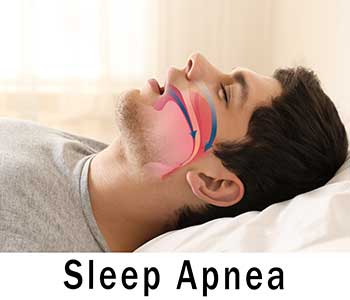San Francisco dentist treats snoring and obstructive sleep apnea

A common but serious sleep related breathing disorder frequently goes undiagnosed because many people dismiss it as harmless snoring. Obstructive sleep apnea involves a halt in airflow while sleeping despite ongoing efforts to breathe. These episodes occur when the sleeping person’s muscles relax, allowing soft tissues to block the airway. Most people who have obstructive sleep apnea snore frequently and loudly, with silent pauses of 10 seconds or longer, which is followed by gasping, snorting, or choking sounds as they resume breathing.
Effects of Obstructive sleep apnea
- Oxygen levels fluctuate
- Heart rate increases
- Daytime blood pressure is chronically elevated
- Increased death rate due to cardiovascular conditions
- Impaired insulin resistance and glucose tolerance
- Reduced ability to concentrate or focus
- Elevated risk of accidents while operating machinery
Risk groups
- Those who are overweight or obese
- Men with a neck 17 inches or larger and women with a neck 16 inches or larger
- Post-menopausal women and middle-aged or older men
- Ethnic minorities
- People who have bony or soft tissue abnormalities in the head or neck
- Heredity – other family members have obstructive sleep apnea
- Smokers
- Hypothyroidism
- People who suffer from nighttime nasal congestion due to rhinitis
About 80 percent of adults with obstructive sleep apnea remain undiagnosed. It is important that those in the high-risk groups remain especially vigilant for signs of this condition. Anyone exhibiting symptoms of obstructive sleep apnea should visit a physician for an accurate diagnosis through a sleep study.
Treatment
Although some nasal sprays and internal or external nasal dilators may reduce snoring, no evidence suggests they help relieve obstructive sleep apnea. Losing weight, avoiding alcohol, stopping smoking, changing sleeping positions, and elevating the head are some behavioral changes that may help reduce symptoms. A device that provides continuous positive airway pressure via pressurized air through a mask worn while sleeping is the standard treatment for sleep apnea. However, many patients complain of discomfort and fail to comply with this treatment.
A simple, comfortable oral appliance is an effective treatment for mild to moderate sleep apnea. These devices work by stabilizing or repositioning the jaw or tongue.
Dr. Leo Arellano is specially trained in dental sleep medicine and he can help people in San Francisco and across the Bay Area find relief from sleep apnea. Call 415-881-4343 to schedule an appointment today.








